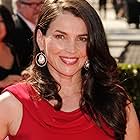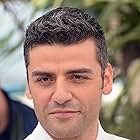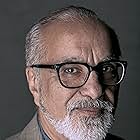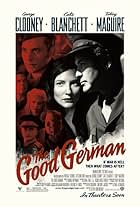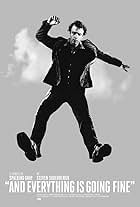In 1956, Ernesto 'Che' Guevara and a band of Castro-led Cuban exiles mobilize an army to topple the regime of dictator Fulgencio Batista.In 1956, Ernesto 'Che' Guevara and a band of Castro-led Cuban exiles mobilize an army to topple the regime of dictator Fulgencio Batista.In 1956, Ernesto 'Che' Guevara and a band of Castro-led Cuban exiles mobilize an army to topple the regime of dictator Fulgencio Batista.
- Director
- Writers
- Stars
- Awards
- 4 wins & 13 nominations total
Oscar Isaac
- Interpreter
- (as Óscar Isaac)
María Isabel Díaz Lago
- María Antonia
- (as María Isabel Díaz)
Demián Bichir
- Fidel Castro
- (as Demian Bichir)
Ramon Fernandez
- Héctor
- (as Ramón Fernández)
Yul Vazquez
- Alejandro Ramírez
- (as Yul Vázquez)
Jsu Garcia
- Jorge Sotús
- (as Jsu García)
Luis Alfredo Rodríguez Sánchez
- Rebel Messenger #1
- (as Luis Rodríguez Sánchez)
Roberto Santana
- Juan Almeida
- (as Roberto Luis Santana)
- Director
- Writers
- All cast & crew
- Production, box office & more at IMDbPro
Featured reviews
Maybe the most refreshing thing about Che, both parts, is that its director, Steven Soderbergh, didn't know anything about Ernesto "Che" Guevara before taking on the project. This is like a good few in the audience, like yours truly. I didn't know much at all about Che except that he was involved with communist uprisings and revolutions, was buddy-buddy with Castro, and died in execution-style as a guerrilla (that, and his image appears on t-shirts everywhere). What Soderbergh provides for an audience that will go to see it for what he will do with the project- and what Benicio Del-Toro does with the character- is that it's a history lesson made vibrant and urgent and passionate and, according to the director in interviews and Q & A's, honest portrayal of events.
If this means that we may not get exactly a fully rounded portrait of its titular protagonist/hero, then that's probably the only real liability that the picture has. Maybe, perhaps, rightfully so; Che wasn't a guy, at least in his prime revolutionary years, to be one that had much warmth or moments of doubt (and if he had them, they were behind closed doors and out of any record of diaries). So what we get in Part 1, the conventional "Rise" of the character in the story, is the tale of how to do a revolution right- or rather, how to take over a government by military force, and it's Che as a man who pretty quickly becomes a natural leader, a stern taskmaster and also someone who "loves" as a revolutionary must, Che says.
It's gripping film-making nevertheless, with Soderbergh commanding the narrative wonderfully between a color-filmed part-digital-part-35mm Red-camera on the 1957-1959 events in Cuba and the 1964 trip to the UN in New York filmed in grainy black and white. What we get is part documentary and part bio-pic, words straight from the guerrilla's mouth, as it were, and the events that led up to the take-over (which serves as the climax of the picture) in Santa Clara, Cuba. Some of the elements, as noted, are conventional of just a war picture: we get the young kids (16 and 14) who will do anything to fight with Guevara and his group; we get the supposed love interest, only (thankfully) muted with only one scene with small talk; and we get the moments of enthusiasm, humor, camaraderie, and unlikely bravery in the heat of battle.
But most importantly we see Benicio del-Toro take command of this role like he does seemingly often but rarely with such force. In fact, he probably elevates this Che past some possible pit-falls (this project was actually his baby, as he serves as co-producer and developed the project for years), and makes him as human as he can be, using Che's health-tic (asthma) to its fullest, and reveling in going for broke as far as gusto and revelation go. For all of Soderbergh's command of the film-making style- most of all, for me, during the climactic battle where we get to see him awesomely direct a battle sequence- del-Toro, for any scene he's in, steals the show. If for nothing else, whatever your political stance or thoughts on Che, he's worth the admission. 8.5/10
If this means that we may not get exactly a fully rounded portrait of its titular protagonist/hero, then that's probably the only real liability that the picture has. Maybe, perhaps, rightfully so; Che wasn't a guy, at least in his prime revolutionary years, to be one that had much warmth or moments of doubt (and if he had them, they were behind closed doors and out of any record of diaries). So what we get in Part 1, the conventional "Rise" of the character in the story, is the tale of how to do a revolution right- or rather, how to take over a government by military force, and it's Che as a man who pretty quickly becomes a natural leader, a stern taskmaster and also someone who "loves" as a revolutionary must, Che says.
It's gripping film-making nevertheless, with Soderbergh commanding the narrative wonderfully between a color-filmed part-digital-part-35mm Red-camera on the 1957-1959 events in Cuba and the 1964 trip to the UN in New York filmed in grainy black and white. What we get is part documentary and part bio-pic, words straight from the guerrilla's mouth, as it were, and the events that led up to the take-over (which serves as the climax of the picture) in Santa Clara, Cuba. Some of the elements, as noted, are conventional of just a war picture: we get the young kids (16 and 14) who will do anything to fight with Guevara and his group; we get the supposed love interest, only (thankfully) muted with only one scene with small talk; and we get the moments of enthusiasm, humor, camaraderie, and unlikely bravery in the heat of battle.
But most importantly we see Benicio del-Toro take command of this role like he does seemingly often but rarely with such force. In fact, he probably elevates this Che past some possible pit-falls (this project was actually his baby, as he serves as co-producer and developed the project for years), and makes him as human as he can be, using Che's health-tic (asthma) to its fullest, and reveling in going for broke as far as gusto and revelation go. For all of Soderbergh's command of the film-making style- most of all, for me, during the climactic battle where we get to see him awesomely direct a battle sequence- del-Toro, for any scene he's in, steals the show. If for nothing else, whatever your political stance or thoughts on Che, he's worth the admission. 8.5/10
Nothing quite like getting your teeth into an epic is there? Sitting back and letting yourself get immersed into a struggle, a journey, in this case the Cuban revolution that has become such a cause celebre for many since the 1950s. By the time I left the cinema I sadly felt as though the epic had been squashed down into an easily swallowed period piece with all the epic grandeur of a Dan Brown novel. The problem with Che Part One is that it doesn't say anything particularly interesting or contain any memorable moments. There is lots and lots of shooting which is actually fairly sanitised (this is certainly no Saving Private Ryan), there is some mistreatment of people who are then avenged and there are lots of shots of Benicio del Toro looking quite idealistic and cool.
Don't get me wrong, there is nothing specifically wrong with this film. It portrays a fairly accurate (if, as I said, sanitised) picture of the March on Santa Clara and the victory of Castro's rebels. However much in the same way as the kind of perpetually running museum film that you can dip in and out of it is largely uninspiring and leaves you feeling quite detached. The problem is not the direction or the acting which does manage to transport you into the heart of a Civil War ravaged Cuba. It is the fact that we learn next to nothing about Cuba, Che himself or the goals of the revolutionaries. We learn nothing of why the Batista regime was so bad that people wanted to overthrow it. Which means that this simply stands alone as a war film where there are lots of explosions, lots of running around and some scenes of people celebrating in the streets. While I understand from reports that Che Part Two is rather different I think that nevertheless the slight blandness of Che Part One means that, though it looks good, it does feel like a rather wasted opportunity.
Don't get me wrong, there is nothing specifically wrong with this film. It portrays a fairly accurate (if, as I said, sanitised) picture of the March on Santa Clara and the victory of Castro's rebels. However much in the same way as the kind of perpetually running museum film that you can dip in and out of it is largely uninspiring and leaves you feeling quite detached. The problem is not the direction or the acting which does manage to transport you into the heart of a Civil War ravaged Cuba. It is the fact that we learn next to nothing about Cuba, Che himself or the goals of the revolutionaries. We learn nothing of why the Batista regime was so bad that people wanted to overthrow it. Which means that this simply stands alone as a war film where there are lots of explosions, lots of running around and some scenes of people celebrating in the streets. While I understand from reports that Che Part Two is rather different I think that nevertheless the slight blandness of Che Part One means that, though it looks good, it does feel like a rather wasted opportunity.
It helps to know that this was originally brought to life as a Terrence Malick screenplay about Che's disastrous forray in Bolivia. Financing fell through and Soderbergh stepped in to direct. He conceived a first part and shot both back to back as one film trailing Che's rise and fall.
He retained however what I believe would be Malick's approach: no politics and a just visual poem about the man behind the image, exhaustive as the horrible slog through Cuban jungles and windswept Andean plateaus must have been. Malick applied this to his New World that he abandoned Che for, lyrical many times over.
But Soderbergh being an ambitious filmmaker, he puzzled over this a little more. Here was a man of action at the center of many narratives about him, some fashioned by himself, conflictingly reported as iconic revolutionary or terrorist, charismatic leader or ruthless thug, erudite Marxist thinker or brutal soldier.
So how to visually exemplify this contradicting ethos as our film about him? And how to arrange a world around this person in such a way as to absorb him whole, unfettered from narrative - but writing it as he goes along - off camera - but ironically on - and as part of that world where narratives are devised to explain him. As flesh and bones, opposed to a cutout from a history book.
One way to do this, would be via Brecht and artifice. The Korda photograph would reveal lots, how we know people from images, how we build narratives from them. Eisenstein sought the same in a deeper way, coming up with what he termed the 'dialectical montage': a world assembled by the eye, and in such ways as the eye aspires to create it.
So what Soderbergh does, is everything by halves: a dialectic between two films trailing opposite sides of struggle, glory and failure, optimism and despair. Two visual palettes, two points of view in the first film, one in the presence of cameras hoping to capture the real person, the other were that image was being forged in action.
The problem, is of course that Brecht and Eisenstein made art in the hope to change the world, to awaken consciousness, Marxist art with its trappings. By now we have grown disillusioned with the idea, and Soderbergh makes no case and addresses no present struggles.
But we still have the cinematic essay about all this.
The first part: a narrative broadcast from real life, meant to reveal purpose, ends, revolution. The second part: we get to note in passing a life that is infinitely more expansive than any story would explain, more complex, beautiful, frustrating, and devoid of any apparent purpose other than what we choose as our struggle, truly a guerilla life.
I imagine a tremendous film from these notions. Just notice the remarkable way Part 2 opens. Che arrives at Bolivia in disguise, having shed self and popular image. No longer minister, spokesman, diplomat, guerilla, he is an ordinary man lying on a hotel bed, one among many tourists. Life could be anything once more, holds endless possibility. Cessation.
What does he do? He begins to fashion the same narrative as before, revolution again. Chimera this time. Transient life foils him in Bolivia. Instead of changing the world once more, he leaves behind a story of dying for it. We have a story about it as our film, adding to the rest.
He retained however what I believe would be Malick's approach: no politics and a just visual poem about the man behind the image, exhaustive as the horrible slog through Cuban jungles and windswept Andean plateaus must have been. Malick applied this to his New World that he abandoned Che for, lyrical many times over.
But Soderbergh being an ambitious filmmaker, he puzzled over this a little more. Here was a man of action at the center of many narratives about him, some fashioned by himself, conflictingly reported as iconic revolutionary or terrorist, charismatic leader or ruthless thug, erudite Marxist thinker or brutal soldier.
So how to visually exemplify this contradicting ethos as our film about him? And how to arrange a world around this person in such a way as to absorb him whole, unfettered from narrative - but writing it as he goes along - off camera - but ironically on - and as part of that world where narratives are devised to explain him. As flesh and bones, opposed to a cutout from a history book.
One way to do this, would be via Brecht and artifice. The Korda photograph would reveal lots, how we know people from images, how we build narratives from them. Eisenstein sought the same in a deeper way, coming up with what he termed the 'dialectical montage': a world assembled by the eye, and in such ways as the eye aspires to create it.
So what Soderbergh does, is everything by halves: a dialectic between two films trailing opposite sides of struggle, glory and failure, optimism and despair. Two visual palettes, two points of view in the first film, one in the presence of cameras hoping to capture the real person, the other were that image was being forged in action.
The problem, is of course that Brecht and Eisenstein made art in the hope to change the world, to awaken consciousness, Marxist art with its trappings. By now we have grown disillusioned with the idea, and Soderbergh makes no case and addresses no present struggles.
But we still have the cinematic essay about all this.
The first part: a narrative broadcast from real life, meant to reveal purpose, ends, revolution. The second part: we get to note in passing a life that is infinitely more expansive than any story would explain, more complex, beautiful, frustrating, and devoid of any apparent purpose other than what we choose as our struggle, truly a guerilla life.
I imagine a tremendous film from these notions. Just notice the remarkable way Part 2 opens. Che arrives at Bolivia in disguise, having shed self and popular image. No longer minister, spokesman, diplomat, guerilla, he is an ordinary man lying on a hotel bed, one among many tourists. Life could be anything once more, holds endless possibility. Cessation.
What does he do? He begins to fashion the same narrative as before, revolution again. Chimera this time. Transient life foils him in Bolivia. Instead of changing the world once more, he leaves behind a story of dying for it. We have a story about it as our film, adding to the rest.
What on earth was director Steven Soderbergh thinking when he decided to tackle the story of Ernesto 'Che' Guevara, the Argentinian born doctor and revolutionary who joined Fidel Castro's campaign to take Cuba back from the American backed dictator, Fulgencio Batista? What motivated the director of Oceans Eleven,Twelve and Thirteen
to make this amazing 4½ hour biopic. Why Che Guevara, and why now? How did he even manage to get the funding for a film about a communist revolutionary in the first place? What was the pitch? Not that there is anything wrong with the film. Far from it. Soderberg tells Guevara's story with loving attention to detail, and without resorting to sentimentality or melodrama.
This is not the first time Che's story has been turned into a movie. The 2004 film, The Motorcycle Diaries, examines the formation of Guevara's early politicization, and But Soderberg's film (with Benicio Del Toro in the lead role as Che Guevara), is the first to try and tell the whole story of Guevara's involvement in the Cuban revolution, and his subsequent attempt to spread the revolution to Boliva, where he was eventually caught and killed in October 1967.
Part 1, deals with the fight against Batista. The long hard slog of waging a guerrilla campaign is covered in great detail as a boatload of 82 revolutionaries head for Cuba during November 1956, and the struggle to win Cuba back for the Cuban people begins.
The first film draws extensively on the Guevara's own writings, especially his memoir "Reminiscences of the Cuban Revolutionary War". The months and years of protracted guerrilla warfare are inter-cut with beautifully recreated scenes showing Che addressing the United Nations in 1964, and conducting numerous interviews with a range of media outlets.
Soderberg uses these scenes to explain some of the history and 'back story' to the Cuban revolution, and to give the audience some insight into Che Guevara the man and revolutionary. Part 1 of Che ends in 1959 as Batista flies into exile in the United States, and the revolutionaries under the leadership of Fidel Castro and Che Guevara are about to enter Havana.
Drawing on Guevara's 'Bolivian Diary', Part 2 of Che takes up the story as Che, going under the pseudonym of 'Ramon', lands in Boliva in 1965, and begins trying to recruit local guerrilla's with the intention of overthrowing the ruling government.
Here, his campaign to recruit local peasant farmers fails, and before he and his small band of revolutionaries are able to launch any sort of major anti government attack, they are hunted down and killed with the help of the Central Intelligence Agency.
Che Guevara was wounded and captured on or about October 9, 1967. It is a matter of record that he was alive at the time of his capture, and that he was subsequently shot and killed to ensure he would no longer be able to foment revolution either in Boliva or elsewhere in Latin America. How ironic then that his execution has sparked a 'cult of the revolutionary' that has not diminished over the intervening 40 plus years since his death.
Of course, apart from the Oceans series of films, Soderberg has shown he is socially aware by also directing Erin Brockovich, Traffic (again with Del Toro), and The Good German, so maybe we shouldn't be surprised that he decided to tackle the story of Ernesto 'Che' Guevara.
Don't be fooled by the inclusion of other A-list cast members (Julia Ormond, Matt Damon, Franka Potente, and Lou Diamond Phillips) in Che. All of these actors have minor roles, and small support parts. In fact Matt Damon is on screen for less than two minutes! I can only assume that Soderberg needed some additional well known actors to help secure finance and distribution for the film.
However, this is without a doubt Benicio Del Toros' film. His performance is a revelation. He inhabits the role of Guevara so well, that there are times when I wasn't sure if the historical footage recreated in black and white didn't have the real Che Guevara in them.
According to the program notes, Soderberg is working an a middle part to Che's story. This film will apparently cover Guevara's experiences in Africa. If this is the case, then this trilogy will indeed constitute Steven Soderberg's masterpiece. I can think of no other biopic to rival it, and the finished series should help to keep the legend of 'Che' Guevara alive for at least another 40 years.
This is not the first time Che's story has been turned into a movie. The 2004 film, The Motorcycle Diaries, examines the formation of Guevara's early politicization, and But Soderberg's film (with Benicio Del Toro in the lead role as Che Guevara), is the first to try and tell the whole story of Guevara's involvement in the Cuban revolution, and his subsequent attempt to spread the revolution to Boliva, where he was eventually caught and killed in October 1967.
Part 1, deals with the fight against Batista. The long hard slog of waging a guerrilla campaign is covered in great detail as a boatload of 82 revolutionaries head for Cuba during November 1956, and the struggle to win Cuba back for the Cuban people begins.
The first film draws extensively on the Guevara's own writings, especially his memoir "Reminiscences of the Cuban Revolutionary War". The months and years of protracted guerrilla warfare are inter-cut with beautifully recreated scenes showing Che addressing the United Nations in 1964, and conducting numerous interviews with a range of media outlets.
Soderberg uses these scenes to explain some of the history and 'back story' to the Cuban revolution, and to give the audience some insight into Che Guevara the man and revolutionary. Part 1 of Che ends in 1959 as Batista flies into exile in the United States, and the revolutionaries under the leadership of Fidel Castro and Che Guevara are about to enter Havana.
Drawing on Guevara's 'Bolivian Diary', Part 2 of Che takes up the story as Che, going under the pseudonym of 'Ramon', lands in Boliva in 1965, and begins trying to recruit local guerrilla's with the intention of overthrowing the ruling government.
Here, his campaign to recruit local peasant farmers fails, and before he and his small band of revolutionaries are able to launch any sort of major anti government attack, they are hunted down and killed with the help of the Central Intelligence Agency.
Che Guevara was wounded and captured on or about October 9, 1967. It is a matter of record that he was alive at the time of his capture, and that he was subsequently shot and killed to ensure he would no longer be able to foment revolution either in Boliva or elsewhere in Latin America. How ironic then that his execution has sparked a 'cult of the revolutionary' that has not diminished over the intervening 40 plus years since his death.
Of course, apart from the Oceans series of films, Soderberg has shown he is socially aware by also directing Erin Brockovich, Traffic (again with Del Toro), and The Good German, so maybe we shouldn't be surprised that he decided to tackle the story of Ernesto 'Che' Guevara.
Don't be fooled by the inclusion of other A-list cast members (Julia Ormond, Matt Damon, Franka Potente, and Lou Diamond Phillips) in Che. All of these actors have minor roles, and small support parts. In fact Matt Damon is on screen for less than two minutes! I can only assume that Soderberg needed some additional well known actors to help secure finance and distribution for the film.
However, this is without a doubt Benicio Del Toros' film. His performance is a revelation. He inhabits the role of Guevara so well, that there are times when I wasn't sure if the historical footage recreated in black and white didn't have the real Che Guevara in them.
According to the program notes, Soderberg is working an a middle part to Che's story. This film will apparently cover Guevara's experiences in Africa. If this is the case, then this trilogy will indeed constitute Steven Soderberg's masterpiece. I can think of no other biopic to rival it, and the finished series should help to keep the legend of 'Che' Guevara alive for at least another 40 years.
He was a revolutionary fighter, a doctor, a social philosopher and a martyr who turned to armed warfare as a 'necessary' means of stamping out the foreign complexities, poverty and injustice that had bled South America for centuries. He was a Marxist, a writer, a guerrilla and a diplomat who rose to prominence as a leader of Fidel Castro's radical '26th of July Movement': a left wing political party that launched an armed invasion of Cuba rapt on toppling U.S backed dictator Fulgencio Batista. This historical revolt: the focal point of director Steven Soderbergh's enduring, coarse and superbly crafted part one of two biopic. A sometimes bitty, sometimes brilliant hand-held epic that succeeds in its failure to fall into the consumer culture camp that's exploited Ernesto 'Che' Guevara's image now for so long.
Steven Soderbergh refrains, then, from counteracting the magnitude of Che: Part One's dense political platform by ramping up the fireworks. This wont appeal to mainstream viewers. This is not a Cuban Braveheart. This is not some twisted Scarface prequel. There will be no post-movie pop-art. Che: Part One is an intelligent and vital take on the man behind the myth not a balls-to-the-wall action spectacle blaring with blood, bullets and CGI. It's a thorough and naturalistic treatise on iconic human drive and endeavour that infrequently shuttles between monochrome and Technicolor, between Che Guevara's 1964 delegation at the UN headquarters and time spent trudging through the Cuban jungle.
If your understanding of certain political ideals and movements are, at best, hazy- then it's best to steer clear of this one. You're likely are likely to find the first serving of Soderbergh's four-and-a-half-hour, two part political epic a little confusing. This ain't no Hollywood funded, slick and stylish, over-dramatic chronicle concerned with entertainment or income. This isn't 'Defiance' or 'Valkrye'. This is a well-researched, claustrophobic and paced political drama (shot in Spanish) where spurts of action, violence and humour are few and far between. Imagine Oliver Stone's 'Salvador' by the way of Terrance Mallick's 'The Thin Red Line': fragmented, anti-mainstream and very heavy-going.
The bravura Benicio Del Toro stars as Che and is quite excellent. He delivers a focused and unwavering performance worthy of a thousand accolades: his finest since '21 Grams'. The fact that Del Toro is fluent in Spanish also helps, as does a rallying and unknown supporting cast that work well as a low-key ensemble. It's all about Del Toro, though. His insurgent, intense and convincing Che is one marred by crippling bouts of asthma yet defined by a burning desire to educate and reform- to put his litigious beliefs into action and unite Latin America.
With Che: Part One, the diligent Steven Soderbergh has found his blend of realism and narrative, documentary and drama. As an avid Che fan and reader of his books and biographies, there is little doubt in my mind that this monumental work will stand as the first piece in the definitive two part screen portrait of one the twentieth century's most iconic, yet largely uncharted, political figures.
Final Verdict: While lesser films wallow in the limelight, Che: Part One stirs understated in the shadows seemingly content with the fact that it wont appeal to all, or many. Steven Soderbergh has crafted a very loyal and well-made biopic. One that demythologises, one that educates, one that excels and ensues Walter Salle's soul-searching Che preface: The Motorcycle Diaries.
Steven Soderbergh refrains, then, from counteracting the magnitude of Che: Part One's dense political platform by ramping up the fireworks. This wont appeal to mainstream viewers. This is not a Cuban Braveheart. This is not some twisted Scarface prequel. There will be no post-movie pop-art. Che: Part One is an intelligent and vital take on the man behind the myth not a balls-to-the-wall action spectacle blaring with blood, bullets and CGI. It's a thorough and naturalistic treatise on iconic human drive and endeavour that infrequently shuttles between monochrome and Technicolor, between Che Guevara's 1964 delegation at the UN headquarters and time spent trudging through the Cuban jungle.
If your understanding of certain political ideals and movements are, at best, hazy- then it's best to steer clear of this one. You're likely are likely to find the first serving of Soderbergh's four-and-a-half-hour, two part political epic a little confusing. This ain't no Hollywood funded, slick and stylish, over-dramatic chronicle concerned with entertainment or income. This isn't 'Defiance' or 'Valkrye'. This is a well-researched, claustrophobic and paced political drama (shot in Spanish) where spurts of action, violence and humour are few and far between. Imagine Oliver Stone's 'Salvador' by the way of Terrance Mallick's 'The Thin Red Line': fragmented, anti-mainstream and very heavy-going.
The bravura Benicio Del Toro stars as Che and is quite excellent. He delivers a focused and unwavering performance worthy of a thousand accolades: his finest since '21 Grams'. The fact that Del Toro is fluent in Spanish also helps, as does a rallying and unknown supporting cast that work well as a low-key ensemble. It's all about Del Toro, though. His insurgent, intense and convincing Che is one marred by crippling bouts of asthma yet defined by a burning desire to educate and reform- to put his litigious beliefs into action and unite Latin America.
With Che: Part One, the diligent Steven Soderbergh has found his blend of realism and narrative, documentary and drama. As an avid Che fan and reader of his books and biographies, there is little doubt in my mind that this monumental work will stand as the first piece in the definitive two part screen portrait of one the twentieth century's most iconic, yet largely uncharted, political figures.
Final Verdict: While lesser films wallow in the limelight, Che: Part One stirs understated in the shadows seemingly content with the fact that it wont appeal to all, or many. Steven Soderbergh has crafted a very loyal and well-made biopic. One that demythologises, one that educates, one that excels and ensues Walter Salle's soul-searching Che preface: The Motorcycle Diaries.
Did you know
- TriviaFor his role, Benicio Del Toro spent seven years researching Guevara's life.
- GoofsWhen the guerrilleros are in the Sierra Maestra, we can hear the coqui (Eleutherodactylus coqui) singing in the night. However, this small frog is endemic to Puerto Rico and the Virgin Islands, thus not possible to be heard in Cuba.
- Quotes
Lisa Howard: What is the most important quality for a revolutionary to possess?
Ernesto Che Guevara: El amor.
Cuban Diplomat #1: [translating] Love.
Lisa Howard: Love?
Cuban Diplomat #1: Love of humanity... of justice and truth. A real revolutionary goes where he is needed.
- ConnectionsFeatured in Así se hizo - Che El Argentino (2008)
- SoundtracksBasura
Written and Performed by Mark A. Mangini (as Mark Mangini)
Details
Box office
- Budget
- $35,000,000 (estimated)
- Gross US & Canada
- $748,555
- Opening weekend US & Canada
- $61,070
- Dec 14, 2008
- Gross worldwide
- $34,209,066
- Runtime
- 2h 14m(134 min)
- Color
- Sound mix
- Aspect ratio
- 2.39 : 1
Contribute to this page
Suggest an edit or add missing content








